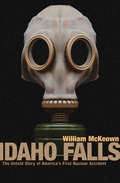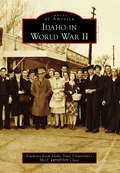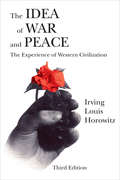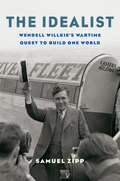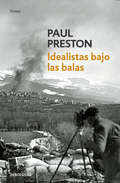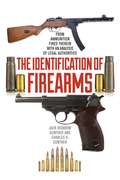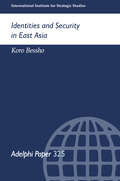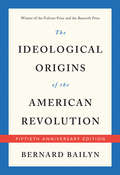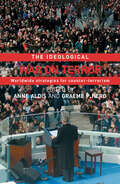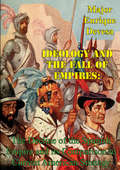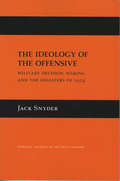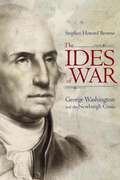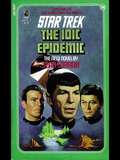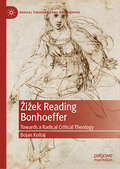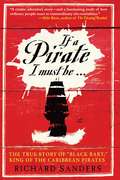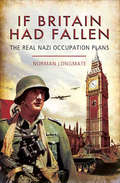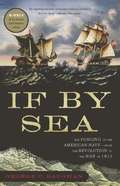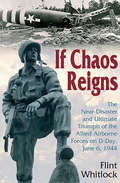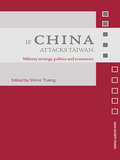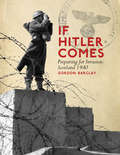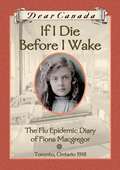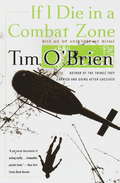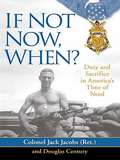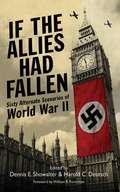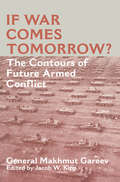- Table View
- List View
Idaho Falls: The Untold Story of America's First Nuclear Accident
by William McKeownThe little-known true story of a mysterious nuclear reactor disaster—years before Three Mile Island, Chernobyl, or Fukushima. Before the Three Mile Island incident or the Chernobyl disaster, the world&’s first nuclear reactor meltdown to claim lives happened on US soil. Chronicled here for the first time is the strange tale of SL-1, an experimental military reactor located in Idaho&’s Lost River Desert that exploded on the night of January 3, 1961, killing the three crewmembers on duty. Through exclusive interviews with the victims&’ families and friends, firsthand accounts from rescue workers and nuclear industry insiders, and extensive research into official documents, journalist William McKeown probes the many questions surrounding this devastating blast that have gone unanswered for decades. From reports of faulty design and mismanagement to incompetent personnel and even rumors of sabotage after a failed love affair, these plausible explanations raise startling new questions about whether the truth was deliberately suppressed to protect the nuclear energy industry.
Idaho in World War II (Images of America)
by Students from Idaho State University’s MGT 4499/5599 ClassAlthough far from the front lines of war, the people of Idaho contributed to the US effort in World War II in myriad ways. Entrepreneurs perfected the dehydration of potatoes and onions that became staples of the rations that sustained Allied troops stationed around the globe. Idahoans mined rare metals and manufactured them into weapons and munitions that allowed US forces to compete with the technologies of their opponents. Local communities organized USO huts that provided coffee, cookies, and warm smiles to homesick troops in transit to and from the war. However, World War II also left an indelible mark on the state of Idaho. On the one hand, the federal government's ambitious construction of airports, buildings, and roads to support the war effort transformed a rural state that had lacked infrastructure. On the other hand, Idaho soil housed detention camps where American citizens were denied fundamental rights. And loss and heartbreak impacted nearly every community.
The Idea of War and Peace: The Experience of Western Civilization (Comparative Policy Evaluation Ser.)
by Irving HorowitzModern theorists and their ideas on war and peace are here presented, interpreted, and evaluated with scholarship and clarity of expression. In examining the main currents in modern social theory, the author has gone directly to the works of the leading philosophic figures. This book is a carefully documented analysis based on primary sources. Its republication in an expanded version after more than a half century since its initial appearance is a welcome addition to the literature on conflict and conflict resolution.In this 2007 greatly expanded third edition of The Idea of War and Peace, Irving Louis Horowitz provides a sense of substance to the character of Western Civilization. The book permits the reader to better understand what the "clash of civilizations" is about. It provides a broad outline of both European and American twentieth century social philosophies as they relate to the issue of war and peace. It also offers a new concluding section that explores in depth this same theme in the first decade of the twenty-first century.Such major figures as Bertrand Russell, John Dewey, Jacques Maritain, Albert Einstein, and Vladimir Lenin, reviewed in earlier editions, are now joined by examinations of the work of Raymond Aron, Harold D. Lasswell, and other contemporaries. The Idea of War and Peace is not just one more manual of how to conduct or avoid conflict, and even less, a guideline to policy-making. Instead, the work offers a profound sense of the theories and values that underline manuals and guides.This third edition is graced by a consideration of major figures in the second half of the twentieth century and a retrospective on the work of Niccolo Machiavelli on the nature of warfare. It also includes chapters on the relationship of war, peace, and the democratic order--and a postscript on new forms of state power and terrorism. This new edition links past and present and serves as an analytical bridge between cen
The Idealist: Wendell Willkie’s Wartime Quest to Build One World
by Samuel ZippWendell Willkie lost the 1940 presidential election but became America’s most effective ambassador, embarking on a 7-week plane trip to bolster the allied cause, encountering everyone from de Gaulle and Stalin to Chiang Kai-shek. Against a wave of nationalism, Willkie promoted a message of global interconnection and peaceful engagement.
Idealistas bajo las balas: Corresponsales extranjeros en la guerra de España
by Paul PrestonLas biografías de algunos de los corresponsales más destacados que cubrieron la Guerra Civil española. La Guerra Civil española supuso la consagración del corresponsal de guerra. Durante casi tres años los ojos del mundo se fijaron en España, y lo más granado de la prensa internacional acudió a dar fe de lo que ocurría. Ernest Hemingway, Martha Gellhorn, John Dos Passos, Mijaíl Koltsov, W.H. Auden, Arthur Koestler, Cyril Connolly, George Orwell, Kim Philby y muchos otros pasaron por España y escribieron lo que vieron, o al menos lo que pudieron. En condiciones precarias, afrontando graves riesgos e inmersos en el frenesí del combate, a todos ellos les transformó la guerra. Paul Preston presenta en Idealistas bajo las balas el retrato de un colectivo legendario, deteniéndose en las biografías de algunos de los corresponsales más destacados: Louis Fischer, Mijaíl Koltsov, George Steer, Jay Allen; y de aquellos que mantuvieron encendida la llama de la República: Herbert Southworth y Henry Buckley. El resultado es un homenaje a todos los que acudieron a observar los acontecimientos y pronto se vieron atrapados por la fascinación de uno de los conflictos decisivos del siglo XX. Reseña:«No puedo sino elogiarlo. Preston deshace los hilos enredados de las mentiras y nos presenta una imagen lúcida y una lectura amena.»Nicholas Shakespeare, Daily Telegraph
Identification of Firearms: From Ammunition Fired Therein With an Analysis of Legal Authorities
by Jack Gunther Charles GuntherThe 1930s was a decade that provided impressive breakthroughs in the field of forensic ballistics, or firearms identification. Following the St. Valentine’s Day Massacre of 1929, where ballistic expert Calvin Goddard’s testimony brought attention to the relatively new field, several forensic ballistic books were published. Among these were Burrard’s The Identification of Firearms and Forensic Ballistics and Hatcher’s Textbook of Firearms Investigations, Identification, and Evidence. Burrard introduced forensic examination to the British judicial system; Hatcher applied his considerable knowledge of firearms and ammunition to weapons’ design, manufacture, and testing. Gunthers’ The Identification of Firearms combined the approaches of these volumes into a new book that emphasized both the painstaking scientific methodology vital to firearms identification, complete with ballistics photographs, and its practical use by analyses of several legal cases where firearms identification was used. These include the infamous Sacco-Vanzetti case, the first in American legal history where forensic ballistics played a very prominent role in courtroom proceedings. The Gunther brothers utilized their respective legal and military experience to provide a comprehensive reference volume that is noteworthy for those interested in law enforcement or ballistics as well as gun enthusiasts.
Identities and Security in East Asia (Adelphi series #325)
by Koro BesshoEast Asia has been relatively free from large-scale conflict in the 1990s, but the absence of security organisations or even of a sense of community within the region has raised doubts about its future security. China and Japan are likely to bear much of the responsibility for maintaining stability, but both countries have been reluctant to adopt a leadership role. South-east Asian states have been willing to take the initiative outside of their sub-region, but they possess neither the resources nor the authority to lead the whole of East Asia. In the long term, the ability to organise the region depends on greater clarity in the identity of leading states in the region, and of the region as a whole. This paper analyses the way in which issues of identity have affected the actions of the key players, and assesses future challenges and possibilities in the search for regional security. It concludes that: Through the Association of South-East Asian Nations (ASEAN), South-east Asian states have developed a sense of confidence and unity. However, ASEAN’s need to safeguard its newly acquired identity means that it has not exported the ‘ASEAN way’ to the wider region of East Asia or the Asia-Pacific. The greater diversity that enlargement will bring and the effects of the crisis since 1997 are likely to make the Association’s defensive instincts still more resistant to change. In the 1990s, Japan has sought to redefine its identity, both in terms of its past and of its post-war values such as pacifism and human rights. This process has compelled Japan to face Asia more squarely, and has increased the country’s self-assurance. As a result, it may become more willing to take the initiative in political and security, as well as economic, areas. For China, nationalism has become more important, just as communism’s position as the country’s unifying ideology has eroded. Beijing has tried to change the status quo in a forceful way. By the close of the 1990s, however, China has become increasingly willing to act as a responsible world power. A key test of this transformation will be Beijing’s treatment of the Taiwan question. The prospects for regional stability depend on Japan’s ability to reform and return to growth. The most pressing task is to revitalise East Asia’s economies. A return to prosperity would encourage China’s reform and opening process; lessen Japan’s introspection; make disagreements between the South-east Asian states less acute; and allow the Asia-Pacific region as a whole to move beyond both the triumphalism of the East Pacific and the resentment of the West.
The Ideological Origins of the American Revolution: Fiftieth Anniversary Edition
by Bernard BailynThe Ideological Origins of the American Revolution is a classic of American historical literature—required reading for understanding the Founders’ ideas and their struggles to implement them. In the preface to this 50th anniversary edition, Bernard Bailyn isolates the Founders’ profound concern with the uses and misuses of power.
The Ideological War on Terror: Worldwide Strategies For Counter-Terrorism (Political Violence)
by Graeme P. Herd Anne AldisThis edited book addresses the appropriateness of US and other counter-terrorist (CT) strategies in Europe and Eurasia, the Middle East, the Asia Pacific region and in Latin America, with a view to improving their effectiveness. The book has three main objectives: to re-examine terrorists' strategic goals and sources of legitimacy and the nature of their ideological support to analyze current US and regional CT strategies and assess their success in de-legitimizing terrorists and undermining their support to provide a strategic synthesis and policy recommendations in light of the research findings. This book will be of interest to students of political violence and terrorism, security studies and international relations in general.
Ideology And The Fall Of Empires: The Decline Of The Spanish Empire And Its Comparison To Current American Strategy
by Major Enrique Gomariz DevesaSometimes, the ideology that formed the basis for founding an empire can become the cause of its fall. The decline of the Spanish Empire is a clear example of how ideology may both adversely influence national grand strategies and trigger processes of decline of an empire. The strong religious conviction of the Habsburgs was a fundamental factor in defining an imperial strategy that did not conform to the genuine interests of Spain as the core of the Empire. This strategy did not take into account limited Spanish capabilities that were not enough to achieve its religious goals.The purpose of this research is not to analyze in depth how religion influenced the decline of the Spanish Empire, but to use this process to establish a paradigm to explain how ideologies can become a negative influence on national policies. Once the paradigm is established, it will be compared to a similar process to develop some valid conclusions regarding the importance of defining national strategic objectives according to the interests and capabilities of each state.Over the last two decades, the desire to expand and promote democracy around the world became the dominant ideology in the United States. Therefore, its influence in the evolution of recent American national strategies serves as a valid comparison. This study presents some conclusions that not only might be applicable for the analysis and study of national strategies, but also may help to understand how and when ideologies that may be necessary to maintain the cohesion of nations and empires, can became a source of national decline.
The Ideology of the Offensive
by Jack SnyderJack Snyders analysis of the attitudes of military planners in the years prior to the Great War offers new insight into the tragic miscalculations of that era and into their possible parallels in present-day war planning. By 1914, the European military powers had adopted offensive military strategies even though there was considerable evidence to support the notion that much greater advantage lay with defensive strategies. The author argues that organizational biases inherent in military strategists attitudes make war more likely by encouraging offensive postures even when the motive is self-defense. Drawing on new historical evidence of the specific circumstances surrounding French, German, and Russian strategic policy, Snyder demonstrates that it is not only rational analysis that determines strategic doctrine, but also the attitudes of military planners. Snyder argues that the use of rational calculation often falls victim to the pursuit of organizational interests such as autonomy, prestige, growth, and wealth. Furthermore, efforts to justify the preferred policy bring biases into strategists decisions biases reflecting the influences of parochial interests and preconceptions, and those resulting from attempts to simplify unduly their analytical tasks. The frightening lesson here is that doctrines can be destabilizing even when weapons are not, because doctrine may be more responsive to the organizational needs of the military than to the implications of the prevailing weapons technology. By examining the historical failure of offensive doctrine, Jack Snyder makes a valuable contribution to the literature on the causes of war.
The Ides of War: George Washington and the Newburgh Crisis (Studies in Rhetoric & Communication)
by Stephen Howard BrowneA history and analysis of how George Washington stopped an attempted military coup at the end of the American Revolutionary War.History tells us that on a day when the forces of civil government confront the forces of military might, no one knows what may follow. Americans believe that they have avoided this moment, that whatever other challenges the country has faced, at least it never has had to deal with the prospects of a coup d’état. Stephen Howard Browne maintains that this view is mistaken, that in fact the United States faced such a crisis, at the very moment when the country announced its arrival on the world scene in the spring of 1783 in a rustic meeting hall along the Hudson River near Newburgh, New York. The crisis was resolved by George Washington, commander in chief of the US Army, in an address he delivered to a roomful of restive and deeply disaffected officers.In The Ides of War, Browne examines the resolution of the first confrontation between the forces of American civil government and the American military—the Newburgh Crisis. He tells the story of what transpired on that day, examines what was said, and suggests what we might learn from the affair. Browne shows that George Washington’s Newburgh Address is a stunning example of the power of human agency to broker one of our most persistent, most troublesome dilemmas: the rival claims to power of civil and military authorities. At stake in this story are biding questions about the meaning and legacy of revolution, the nature of republican government, and ultimately what kind of people we are and profess to be.Browne holds that although these are monolithic and vexed themes, they are vital and need to be confronted to obtain a coherent and convincing account of history. The Newburgh Crisis offers an unmatched opportunity to examine these themes, as well as the role of rhetoric in the founding of the world’s first modern republic.“Few speeches have shaped the course of American history more than George Washington’s address to his potentially mutinous officers in Newburgh, New York, on March 15, 1783. In this splendid book, Browne deftly brings to life the Newburgh conspiracy, Washington’s masterful response to it, and the lasting implications of both for civil-military relations in a republican government.” —Stephen Lucas, Evjue-Bascom Professor in the Humanities, University of Wisconsin“This elegant and persuasive book expands our knowledge of a little known but hugely significant turning point in American history, one that set it on course toward liberty and democracy. In the process, Browne brings new understanding to the founding of the United States, its military system, and its first commander in chief.” —Richard H. Kohn, professor emeritus of history and peace, war, and defense, University of North Carolina at Chapel Hill
The IDIC Epidemic (Star Trek: The Original Series #38)
by Jean LorrahI.D.I.C.—Infinite Diversity in Infinite Combination. More than just a simple credo, for those of the planet Vulcan it is the cornerstone of their philosophy.On the Vulcan Science Colony Nisus, that credo of tolerance, known as I.D.I.C. (Infinite Diversity in Infinite Combination) is being being put to its sternest test. For here, on a planet where Vulcan, human, Klingon, and countless other races live and work side by side, a deadly plague whose origins has sprung up. Aplague whose origins are somehow rooted in the concept of I.D.I.C. itself. A plague that threatens to tear down that centuries-old maxim and replace it with an even older concept: Intersellar War.
Žižek Reading Bonhoeffer: Towards a Radical Critical Theology (Radical Theologies and Philosophies)
by Bojan KoltajThis book critically examines Bonhoeffer’s social theology in Sanctorum Communio from the perspective of Žižek’s theological materialism. Specifically, it refers to Žižek’s struggling universality of abandonment and its ethic of indifference in consideration of Bonhoeffer’s transcendental personalist community of saints and its ethic of universal love. As such, it represents an attempt to reflect on the content, act, and implication of theological thought without presuppositions and an argument for the necessity of such an approach—a radical approach that is true to theology’s critical character of challenging narratives and revealing exceptions in search of truth.
If a Pirate I Must Be: The True Story of Black Bart, "King of the Caribbean Pirates"
by Richard SandersIn a page-turning tale brimming with adventure, author Richard Sanders tells of the remarkable exploits of Bartholomew Roberts (better known as Black Bart), the greatest of the Caribbean pirates. He drank tea instead of rum. He banned women and gambling on his ships. He never made his prisoners walk the plank, instead inviting them into his cabin for a friendly chat. And during the course of his extraordinary two-and-a-half-year career as a pirate captain, he captured four hundred prizes and brought trade in the eastern Caribbean to a standstill. In If a Pirate I Must Be..., Richard Sanders tells the larger-than-life story of Bartholomew Roberts, aka Black Bart. Born in a rural town, Roberts rose from third mate on a slave ship to pirate captain in a matter of months. Before long, his combination of audaciousness and cunning won him fame and fortune from the fisheries of Newfoundland to the slave ports of West Africa. Sanders brings to life a fascinating world of theater and ritual, where men (a third of whom were black) lived a close-knit, egalitarian life, democratically electing their officers and sharing their spoils. They were highly (if surreptitiously) popular with many merchants, with whom they struck incredibly lucrative deals. Yet with a fierce team of Royal Navy pirate hunters tracking his every move, Roberts' heyday would prove a brief one, and with his capture, the Golden Age of pirates would pass into the lore and legend of books and movies. Based on historical records, journals and letters from pirates under Roberts' command, and on writings by Roberts himself, If a Pirate I Must Be... is the true story of the greatest pirate ever to sail the Caribbean.
If Britain Had Fallen: The Real Nazi Occupation Plans (Greenhill Military Paperbacks)
by Norman LongmateWhat if Germany had invaded the British Isles? &“A distinguished contribution to the canon of alternate histories&” (Military History). If Britain Had Fallen is a fascinating contemplation of what it would have been like for Britain to live day to day under Nazi occupation. It discusses every phase of the scenario, from the German pre-invasion maneuvering and preparations, to the landing of troops, to the German seizure of power. What would have happened to the king and the government? Would America, Canada, or Australia have come to the rescue? Would the British people have grown to accept the occupation? Would the deportation of friends and the flying of the swastika from Buckingham Palace incite passive compliance, or brave resistance? All these questions and more are explored in this thought-provoking and chilling pastiche of the twentieth century&’s most enduring and darkest episodes. Based on a classic television film of the same name, this book includes illustrations and an updated foreword by military historian Norman Longmate.
If By Sea: The Forging of the American Navy--from the Revolution to the War of 1812
by George C. DaughanThe American Revolution-and thus the history of the United States-began not on land but on the sea. Paul Revere began his famous midnight ride not by jumping on a horse, but by scrambling into a skiff with two other brave patriots to cross Boston Harbor to Charlestown. Revere and his companions rowed with muffled oars to avoid capture by the British warships closely guarding the harbor. As they paddled silently, Revere’s neighbor was flashing two lanterns from the belfry of Old North Church, signaling patriots in Charlestown that the redcoats were crossing the Charles River in longboats. In every major Revolutionary battle thereafter the sea would play a vital, if historically neglected, role. When the American colonies took up arms against Great Britain, they were confronting the greatest sea-power of the age. And it was during the War of Independence that the American Navy was born. But following the British naval model proved crushingly expensive, and the Founding Fathers fought viciously for decades over whether or not the fledgling republic truly needed a deep-water fleet. The debate ended only when the Federal Navy proved indispensable during the War of 1812. Drawing on decades of prodigious research, historian George C. Daughan chronicles the embattled origins of the U. S. Navy. From the bloody and gunpowder-drenched battles fought by American sailors on lakes and high seas to the fierce rhetorical combat waged by the Founders in Congress, If By Sea charts the course by which the Navy became a vital and celebrated American institution.
If Chaos Reigns: The Near-Disaster and Ultimate Triumph of the Allied Airborne Forces on D-Day, June 6, 1944
by Flint Whitlock&“A gem of a book that highlights the &‘fog of war&’ as seen by American, British, and Canadian airborne units when they parachuted behind enemy lines.&” —WWII HistoryMagazine &“Gentlemen, do not be daunted if chaos reigns; it undoubtedly will.&” So said Brigadier S. James Hill, commanding officer of the British 3rd Parachute Brigade, in an address to his troops shortly before the launching of Operation Overlord—the D-Day invasion of Normandy. No more prophetic words were ever spoken, for chaos indeed reigned on that day, and many more that followed. Much has been written about the Allied invasion of France, but award-winning military historian Flint Whitlock has put together a unique package—the first history of the assault that concentrates exclusively on the activities of the American, British, and Canadian airborne forces that descended upon Normandy in the dark, pre-dawn hours of June 6, 1944. Landing into the midst of the unknown, the airborne troops found themselves fighting for their lives on every side in the very jaws of the German defenses, while striving to seize their own key objectives in advance of their seaborne comrades to come. Whitlock details the formation, recruitment, training, and deployment of the Allies&’ parachute and glider troops. First-person accounts by veterans who were there—from paratroopers to glidermen to the pilots who flew them into the battle, as well as the commanders (Eisenhower, Taylor, Ridgway, Gavin, and more)—make for compelling, &“you-are-there&” reading. If Chaos Reigns is a fitting tribute to the men who rode the wind into battle and managed to pull victory out of confusion, chaos, and almost certain defeat.
If China Attacks Taiwan: Military Strategy, Politics and Economics (Asian Security Studies)
by Steve TsangThis is a new analysis of the key issues facing Chinese policy makers in their approach towards Taiwan. This is one of the most tense and potentially explosive relationships in world politics. This book explains succinctly the impetus, the methods and the consequences if China is to use force, a prospect that has become greater following the return of President Chen Shui-bian to power in Taiwan for a second term in 2004. If China Attacks Taiwan shows how in reality there can be no real winner in such an eventuality and how the consequences would be dire not just for Taiwan and China, but East Asia as a whole. Whether China will use force depends ultimately on how its policy making apparatus assess potential US intervention, whether its armed forces can subdue Taiwan and counter US military involvement, as well as on its assessment of the likely consequences. Given the extremely high probability of American involvement this volume appeals to not only scholars and students working on China, its foreign policy and the security and prosperity of East Asia, but also to policy makers and journalists interested in China’s rise and its defense policy, Taiwan’s security and development, regional stability as well as US policy toward China and the East Asia region generally. This book is essential for understanding China’s efforts to achieve a ‘peaceful rise’, which requires it to transform itself into a global power not by the actual use of force but by diplomacy backed up by rapidly expanding military power. This book is an excellent resource for all students and scholars of military and security studies, Asian (China/Taiwan) studies and international relations
If Hitler Comes: Preparing for Invasion: Scotland 1940
by Gordon BarclayThe first book to provide a comprehensive account of the anti-invasion defenses built in Scotland during World War II. Between May 1940 and the summer of 1941, the British people expected a German invasion that, had it succeeded, would have enslaved them into the Nazis&’ racist war. This period saw an unparalleled effort to prepare the defense of the UK against invasion. Scotland&’s nationally important heavy industries, vital Royal Navy bases, and one of the UK&’s key ports, were very vulnerable to the sort of airborne attack that had devastated the defenses of Belgium. Everyone was certain that a Fifth Column of Nazi sympathizers and agents was working actively to spread rumors and despair, and to aid the invasion forces, and in reality, the country was far from united. Although the 1939-45 War is the most written-about war in history there is no account of the heroic efforts made in those months to prepare Scotland for the inevitable invasion, and how the defenses were intended to be used. This book tells that story, against the wider history of the period and its people, and describes what was built, and what now survives.&“The book details transportation infrastructure and the construction of military bases and various structures and barriers, concentrating on defense efforts on coastal beaches and harbors. The study explores shows how defense plans changed in response to shifts in defense policy and the misconceptions of those planning the defenses, including misunderstanding of German military strategies. B&W historical and contemporary photos and maps are included.&” —ProtoView
If I Die Before I Wake: The Flu Epidemic Diary of Fiona Macgregor, Toronto, Ontario, 1918
by Jean LittleFiona comes from a large and loving family where she, her older sisters and her mother are all twins. But soon her loving family is torn apart as the Spanish flu is brought to Canada by soldiers returning from fighting overseas in World War I. Fiona turns to her diary, pouring out her fears as her sisters fall ill with the deadly disease. Will Fee lose those dear to her?
If I Die in a Combat Zone: Box Me Up and Ship Me Home
by Tim O'BrienA classic from the New York Times bestselling author of The Things They Carried "One of the best, most disturbing, and most powerful books about the shame that was / is Vietnam."—Minneapolis Star and TribuneBefore writing his award-winning Going After Cacciato, Tim O'Brien gave us this intensely personal account of his year as a foot soldier in Vietnam. The author takes us with him to experience combat from behind an infantryman's rifle, to walk the minefields of My Lai, to crawl into the ghostly tunnels, and to explore the ambiguities of manhood and morality in a war gone terribly wrong. Beautifully written and searingly heartfelt, If I Die in a Combat Zone is a masterwork of its genre.Now with Extra Libris material, including a reader&’s guide and bonus content.
If Not Now, When?: Duty and Sacrifice in America's Time of Need
by Douglas Century Colonel Jack JacobsA Medal of Honor recipient looks back at his own service?and ahead to America?s future. Jack Jacobs was acting as an advisor to the South Vietnamese when he and his men came under devastating attack. Wounded, 1st Lt. Jacobs took command and withdrew the unit, returning again and again, saving fourteen lives?for which he received the Medal of Honor. Here, Col. Jacobs tells his stirring story of heroism, honor, and the personal code by which he has lived his life, and expounds with blunt honesty and insight his views on our contemporary world, and the nature and necessity of sacrifice. If Not Now, When? is a compelling account of a unique life at both war and peace, and the all-too-often unexamined role of the citizenry in the service and defense of the Republic.
If the Allies Had Fallen: Sixty Alternate Scenarios of World War II
by William R. Forstchen Dennis E. Showalter Harold C. DeutschWhat if Stalin had signed with the West in 1939? What if the Allies had been defeated on D-Day? What if Hitler had won the war?From the Munich crisis and the dropping of the first atom bomb to Hitler's declaration of war on the United States and the D-Day landings, historians suggest "what might have been" if key events in World War II had gone differently.Written by an exceptional team of historians as if these world-changing events had really happened. If The Allies Had Fallen is a spirited and terrifying alternate history, and a telling insight into the dramatic possibilities of World War II. Contributors include: Thomas M. Barker, Harold C. Deutsch, Walter S. Dunn, Robert M. Love, D. Clayton James, Bernard C. Nalty, Richard J. Overy, Paul Schratz, Dennis E. Showalter, Gerhard L. Weinberg, Anne Wells, and Herman S. Wolk.
If War Comes Tomorrow?: The Contours of Future Armed Conflict (Soviet (Russian) Military Theory and Practice #No. 7)
by General Makhmut GareevMilitary affairs have been affected by major changes in recent years. The bipolar world of two superpowers has gone. The Cold War and the global military confrontation that accompanied it have ended. A new military and political order has emerged in the world, but the world has not become more stable; indeed, wars and armed conflict have become much more common.Forecasting the contours of future armed conflict is no easy task at such times, but this is the primary objective of If War Comes Tomorrow? Focusing on the impact of new technologies, General Gareev considers whether war is still a continuation of politics by other means' or whether the political, ideological, and technical transformation have broken that connection. He explores the linkage between threats to Russian national interests and war as an instrument of policy in great detail and concludes that there is very little prospect either of nuclear war or widespread conventional war. However, he does see local armed conflicts and local wars increasing, with greater emphasis on subversion. He argues that coming decades will see a shift towards a reliance upon indirect means to accomplish limited political ends, and analyses both information warfare and the revolution in military affairs from this perspective.
